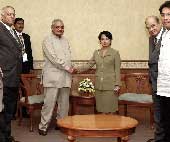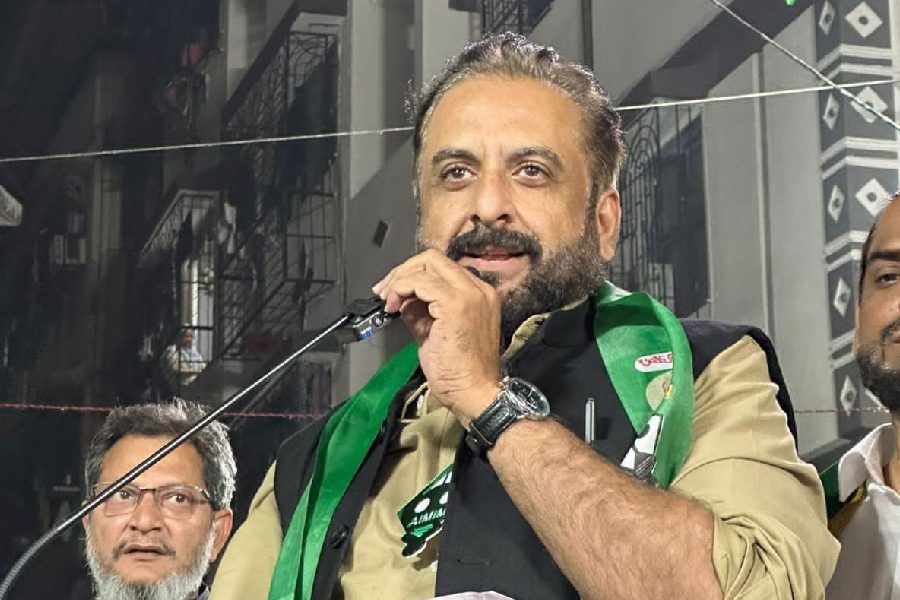|
|
| Research and Analysis Wing office in Delhi |
When Atal Bihari Vajpayee said, after one of his prime ministerial meetings with President George W. Bush, that India and the United States of America were ?natural allies?, an American friend with an abundant supply of humour said it had taken a while for the Americans to catch up with India in the alliance. India had already been a victim of terrorism for at least 15 years before the US came face to face with September 11, 2001. Indians had suffered several years of Enron before the Americans too joined in their suffering. A third element in this ?natural? alliance has now been added.
Bush hand-picked a new chief of the Central Intelligence Agency in September last year ? fellow Republican and then Congressman from Florida, Porter Goss. Goss, who began his career as a clandestine agent for the CIA, stirred up a hornet?s nest at the agency?s headquarters in Langley as soon as he took charge as director, firing people, bringing in his confidantes from Capitol Hill and generally shaking up the place. The turmoil continues to this day. Last weekend, Newsweek revealed that Goss had unceremoniously packed off members of three CIA advisory boards that included the former secretary of state, Henry Kissinger, and two former CIA chiefs, William Webster and James Woolsey.
The Central government offices complex off New Delhi?s Lodhi Road, which houses the Research and Analysis Wing, India?s external spy agency, will soon be a mirror image of Langley as it gets ready for a shake-up. By a curious coincidence, the so-called natural alliance with the Americans will be a major factor in RAW?s coming shake-up. It was the defection, to the US, of a RAW operative, Ravinder Singh, a few months ago that finally triggered an inevitable turmoil which has been gathering within the agency for a long, long time.
Unfortunately for RAW ? and for the country, which it has served with credit, despite many shortcomings ? changes in the agency are taking place at the wrong time. With the death of the national security adviser, J.N. Dixit, RAW has lost someone who called the agency severely to account during his long years in South Block or as head of Indian missions in India?s neighbourhood, and, finally during the seven months that he served as the principal aide on foreign policy and national security to the prime minister, Manmohan Singh.
But Dixit also saw in RAW a vital, indeed indispensable, tool for the successful conduct of India?s external affairs. Ever since Indira Gandhi set up the agency in September 1968, RAW has been the envy of a large number of babus in the Indian system who view the bureaucracy as a milch cow.
Ambassadors who think of themselves as god?s gift to Indian diplomacy have resented the freedom that RAW officers exercise within their missions, the fact that they do their own things or that ambassadors don?t often know what these officers are reporting back to New Delhi, more so if a head of mission is intellectually or otherwise deficient and cannot be fully taken into confidence from RAW?s point of view. Indian police officers or those from the defence services who have been sent to RAW on deputation and have come up short, have also resented their own inadequacies and turned against RAW institutionally when they have been sent packing to the backwaters that they came from. Many others in babudom are convinced that their counterparts in RAW are doing little more than wining and dining abroad. Resentful and full of bile, such men, in their fantasies of a 007-type lifestyle that they attribute to RAW operatives, have consistently attempted to take out their frustrations on the agency.
It is in the fitness of things that RAW should be reformed. Every intelligence agency in the world is changing in the 21st century and adapting itself to the challenges of a world that is very different from what humankind knew since the two world wars. But in doing so, what is needed from the reformers is commitment to RAW itself, not any pre-judgment that will condemn the agency to self-destruction.
The defection of Ravinder Singh was the proverbial straw that broke the camel?s back. While RAW?s professional record, especially in India?s neighbouring countries, must be applauded, it is a blot on the organization that it has been notoriously lenient towards those in its service who broke time-honoured, strict rules of espionage. If some of those offenders had been with the KGB, they would simply have been shot. If they had been with the CIA, they would have spent a life-term in jail.
It is true that some RAW operatives who have been guilty of acts of omission or commission had once acquitted themselves creditably in very difficult stations abroad, even in enemy capitals and had come to serious physical harm in the discharge of their duties. Like one IPS officer, originally from the Uttar Pradesh cadre, who ?lost? a briefcase with top secret documents during a RAW assignment in Germany. Or an operative, who was on deputation to RAW from the army and was compromised in a honey trap on a posting to Tehran. Another officer, also ex-army, was arrested for shoplifting in Vienna about a decade ago, but continues to man one of the most sensitive and promising jobs in the entire agency.
There is nothing surprising about intelligence agencies wanting to hush up lapses in their system. That is a common practice all over the world. Agencies like RAW are also understandably reluctant to prosecute offenders from their ranks. It is only when the lid cannot be kept over a scandal, as in the case of Ravinder Singh, does the public usually get to hear anything about it. The most notorious case to ever come to light was that of RAW?s station chief in Colombo in the early Eighties ? who was subsequently posted as the agency?s chief operative stationed in Chennai and dealing with Sri Lankan Tamil militants during the period leading up to the disastrous deployment of the Indian Peace-keeping Force in Sri Lanka. The officer, who was subverted by the Americans, was arrested, but eventually released and disciplined.
In the latest Ravinder Singh episode, as scandalous as his recruitment by the Americans was the way he fled the country despite being under surveillance. Because the agency has been expecting doom to descend on it after Ravinder Singh?s flight, it has so far taken only half-hearted measures to repair RAW?s broken structure. That points to low morale in the agency, of which there is other evidence as well. A special secretary in the organization and an additional secretary, who were investigated in connection with the latest scandal, have remained at their highly sensitive jobs both during and after the inquiry. Another additional secretary who came under the needle of suspicion has also been able to keep his job. Inquiries make little sense if those very officers who are being investigated control the flow of information and documents to the inquirers while they are being investigated.
One thing that stands out as a common thread in all the major and minor instances of subversion within RAW is that the dramatis personae in all these cases are officers who have been sent to the agency from outside ? some from the IPS, others from the army. There has not been one major case of a RAW cadre officer, that is, someone who started his career as a professional RAW operative, being compromised.
RAW has produced some outstanding chiefs who came into the organization from outside and were absorbed into its cadre. One such chief originally belonged to the Indian postal service. The black sheep are inevitably those who join the organization on deputation. That makes a strong case for strengthening and promoting RAW?s own cadre, officers who are dedicated to the agency from the very beginning of their career. That case needs to be made out now, more than ever, when there is talk of bringing in an outsider to be the next chief of the agency or of making RAW a grazing area for the IPS. If Bush has handed over the CIA, at a very critical time in US history, to someone who began his career with the agency, America?s ?natural ally? ought to consider handing over its own spy agency to someone who belongs to RAW, whose dedication is to the agency and not to his parent service.











